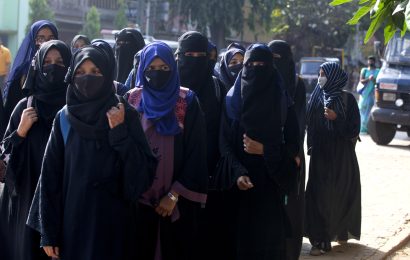NewsKashmir Desk
Recently, the supreme court in 395-page landmark judgment on the triple talaq issue stated that ” In view of the different opinions recorded, by a majority of 3:2 the practice of talaq-e-bidat – triple talaq is set aside.” It is signed by all the five judges involved, namely Jagdish Singh Khehar (Chief Justice), Kurian Joseph, Rohinton Fali Nariman, Uday Umesh Lalit and S. Abdul Nazeer.
The reactions overall are welcoming .Noted writer and communist leader Brinda Karat in her column titled BJP’s Hypocrisy In Seeking Credit For Triple Talaq Ban
wrote – “
This order constitutes a victory for the secular struggle for women’s rights. Any judgement which enhances the rights of women of one community certainly impacts positively on all women. Muslim women have been in the forefront of the struggle against what they consider a patriarchal misinterpretation of Koranic tenets such as the talaq-e-bidat form of divorce which is instant and arbitrary, and all credit to their struggle and that of democratic women’s organisations like AIDWA who took up this issue many decades ago and campaigned in a sustained manner among Muslim women.
The reactions of BJP leaders are amusing, hailing it as their victory. It is nothing of the sort. The court has maintained a fine balance between the protection for personal laws granted by the constitution and judicial intervention. In the majority judgement too, the judgement is careful to point out that it is related to only one type of triple talaq, talaq-e-bidat, which it found arbitrary and not intrinsic to Koranic tenets. It did not accept the efforts and arguments of the Attorney General representing the central government to widen the scope of the court intervention to other aspects of divorce under Muslim personal law. The efforts to bring in arguments in favour of the Uniform Civil Code were also not taken into consideration by the Court. In fact, the Chief Justice of India made a specific mention of the arguments of the Attorney General and made an implicit warning against a “cascading effect.”
Prof Rakesh Sinha , Delhi University and honorary director, India Policy Foundation.,in his opinion piece published in NDTV Wrote “The Supreme Court’s verdict on triple talaq naturally entails further discussion on the necessity of a Uniform Civil Code (UCC) for the country. This is not far-fetched since, in a liberal, democratic and secular society, gender justice based on a sense of equality can only be ensured by a common civil code. The Supreme Court ruling on triple talaq as unconstitutional is a landmark, not only for victims of the medieval practice, but also because this is the first time that the Indian state has taken a radical stand on the issue.
In 1950s, during a discussion on the Hindu Code Bill in the Lok Sabha, J B Kripalani, a socialist and former President of the Indian National Congress, accused the Nehru government of being communal since it was proposing modernization of a community and not extending the benefits to Muslims. Nehru was guided by Curzon’s philosophy to justify obscurantism and gender inequality to appease Muslims. Both of them failed to understand that the state does not belong to a community and the moral and legal duty of agencies and institutions of the state is to increasingly infuse scientific temperament and modernity.”
Overall throughout the country the striking down of Triple Talaaq is being welcomed.



